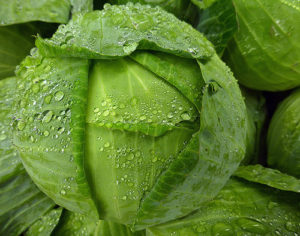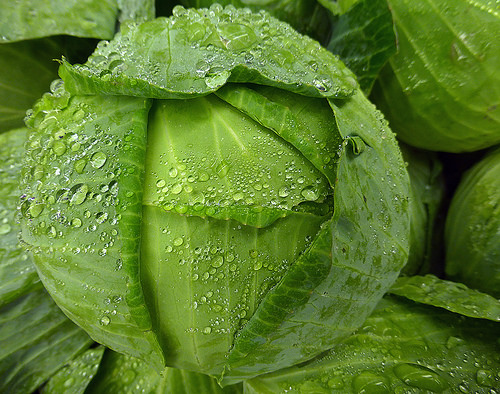Short Answer:
Yes, Cabbage is Paleo!
Cabbage, Its Types and Nutrition
Cabbage is a cruciferous vegetable from the Brassica family together with broccoli, kale and collards. It has a round shape composed of green leaf layers. The inner leaves of cabbage are usually lighter green in color because they protected from sunlight. The flavor of the cabbage varies with the type ranging from sweet to savory.
There are three major types of cabbages. They are green, red and savoy. The green cabbage is the most common among all cabbages. Its color can vary from light to dark green. It has smooth leaves. Red cabbage is either red or purple in color. Like the green cabbage, it also has a smooth leaves and is often used for pickling. Both red and green cabbages have defined taste and crunchy texture. Savoy cabbage is ruffled and has a yellow-green color. It is more delicate in nature. Other varieties of cabbage include bok choy and Chinese cabbage.
Cabbage has been a staple in most diets worldwide because of its abundance and inexpensiveness. It is often used in salads, soups and stir fries. It can also be pickled and fermented to make sauerkraut and kimchi.
Green leafy vegetables are one of the main sources of nutrients in the Paleo Diet and provide integrated nourishment and nutrition. Cabbage contains sufficient amounts of vitamins and minerals which are beneficial to the body. Vitamin C is the most abundant vitamins in cabbage. It is a good source of iron, iodine, magnesium, phosphorus, thiamin, Vitamin K, Vitamin B6, folate, calcium and manganese. It is also rich in dietary fiber and sulfur and very low in cholesterol and saturated fats.
Health Benefits of Cabbage
Cabbage has been listed as one of the healthiest vegetables because of its benefits. These include anti-cancer, anti-inflammatory, antioxidant, digestive support, heart, eyes and bones benefits
Heart Health
Cabbage has adequate amounts of potassium, which is a very important component in controlling and regulating heart rate and blood pressure. As a vasodilator, potassium opens up the blood vessels and eases blood flow. Iron in cabbage is responsible for red blood formation.
Cabbage can also help lower “bad cholesterol” levels in blood, which can build up in arteries and cause heart disease.
Bone Health
Another role of vitamin K is that it helps in bone metabolism, transporting calcium into the bones. All cruciferous vegetables are great sources of calcium, magnesium and potassium, which are essential minerals that promote bone health by protecting the bones from degradation and weakening.
Anti-cancer Properties
Cabbage is also very high in sulfur. Organosulfur compounds that are present in all brassicas, including cabbage, have the potential to reduce carcinogens derived from high heat cooking. The powerful antioxidants found in cabbage can ward off free radicals which are major contributors of chronic diseases in the heart and cancer. Indole-3-carbinol a phytonutrient in cabbage has been shown to prevent or slow down the growth of cancer cells. Other anti-cancer compounds found in cabbage are lupeol, sinigrin and sulforaphane which helps in inhibiting the growth of tumors.
Antioxidants and Immune Health
The richness of vitamins C in cabbage is essential for healthy immune system. Vitamin C is an antioxidant that can help counter free radicals and help in repairing the wear and tear in the body. It can also protect against infection.
Anti-inflammatory Benefits
Cabbage contains glutamine, a strong anti-inflammatory agent. This can help reduce the effects of inflammation, irritation, allergies, joint pain, fever, and different skin disorders. The anthocyanins and polyphenols found in cabbage are compounds that provide anti-inflammatory benefits.
Brain Health
Cabbage is a good brain food. The iodine, Vitamin K and anthocyanins in cabbage can boost mental function. Consuming cabbage can improve defense against neural degeneration, Alzheimer’s disease, and even dementia.
Eye Health
Beta carotenes are known to have the ability to prevent macular degeneration, promoting good eye health and delayed cataract formation. Cabbage is also a rich source of beta-carotene.
Digestive Support
Even before, cabbage has been a remedy for constipation and other related digestive problems. The high amounts of dietary fiber that cabbage contains can help the body retain its water and maintain bulk in the food as it passes through the bowels. Cabbage can also help treat ulcers through its glucosinolates and polyphenols which aids in proper regulation of bacteria in the stomach.
Skin Care
Free radicals can be an underlying cause of wrinkles, skin discoloration and premature aging. The different antioxidants in cabbage together with Vitamin E and sulfur are beneficial for skin health and preventing premature aging.
Maintaining Weight
Cabbage has been a dietary recommendation for people who are trying to maintain or lose weight. It is packed with vitamins, minerals and antioxidants but extremely low in calories, saturated fat and cholesterol.
How About Goitrogens?
Goitrogen is a substance that hinders with the function of the thyroid gland by inhibiting iodine uptake therefore causing goiter, a condition of swelling of the thyroid gland. Foods that are goitrogenic include sweet potatoes, soy products and cruciferous vegetables. Goitrogen could be a concern for people with thyroid issues as this may trigger the problem.
Based on studies, cooking and fermenting can eliminate almost half of the goitrogen substances in cabbage. If you are a fan of cabbage, this could be a great opportunity to incorporate it into your diet. Just make sure to ensure iodine supplementation.
What Experts Say About Cabbage
“Sulforaphane, an organosulfur compound found in broccoli (especially the sprouts), cabbage, brussel sprouts, and cauliflower, inhibited mitochondrial permeability and reduced oxidative stress by increasing glutathione activity in rats.” – Mark Sisson
All you ever wanted to know about Cabbage and Paleo
Mark’s Daily Apple. Why You Should Eat Sulfur-Rich Vegetables
http://www.marksdailyapple.com/why-you-should-eat-sulfur-rich-vegetables/#axzz3KUIvau10
Chris Kresser. RHR: Do Raw Vegetables Hurt Your Thyroid Health?
https://chriskresser.com/do-raw-vegetables-hurt-your-thyroid-health/
Robb Wolf. Fear and Loathing at the Dinner Table
http://robbwolf.com/2011/11/02/fear-and-loathing-at-the-dinner-table/
Paleo Grubs. Foods You Can Eat on the Paleo Diet
http://paleogrubs.com/paleo-diet-food-list
Original Eating. Cabbage.
http://www.originaleating.com/paleo-diet-food-list/vegetable/cabbage/
Livestrong. List of Vegetables for the Paleo Diet
http://www.livestrong.com/article/324840-list-of-vegetables-for-the-paleo-diet/
Paleo Porn. Is Cabbage Paleo?
http://paleoporn.net/q/is-cabbage-paleo/
The World’s Healthiest Foods. Cabbage
http://www.whfoods.com/genpage.php?tname=foodspice&dbid=19
Organic Facts. Health Benefits of Cabbage
https://www.organicfacts.net/health-benefits/vegetable/health-benefits-of-cabbage.html
Did we miss anything?
Comment below and let us know what you think. Do you agree with our conclusion?
photo credit: Wet Cabbage

